- Home
- Ernest Hemingway
Men Without Women
Men Without Women Read online
BOOKS BY ERNEST HEMINGWAY
NOVELS
The Torrents of Spring
The Sun Also Rises
A Farewell to Arms
To Have and Have Not
For Whom the Bell Tolls
Across the River and Into the Trees
The Old Man and the Sea
Islands in the Stream
The Garden of Eden
True at First Light
A Farewell to Arms: The Hemingway Library Edition
STORIES
In Our Time
Men Without Women
Winner Take Nothing
The Fifth Column and Four Stories of the Spanish Civil War
The Short Stories of Ernest Hemingway
The Snows of Kilimanjaro and Other Stories
The Nick Adams Stories
The Complete Short Stories of Ernest Hemingway
NONFICTION
Death in the Afternoon
Green Hills of Africa
Selected Letters 1917-1961
A Moveable Feast
The Dangerous Summer
Dateline: Toronto
By-Line: Ernest Hemingway
A Moveable Feast: The Restored Edition
ANTHOLOGIES
On Writing
Hemingway on Fishing
Hemingway on Hunting
Hemingway on War
For Evan Shipman
SCRIBNER PAPERBACK FICTION
Simon & Schuster Inc.
Rockefeller Center
1230 Avenue of the Americas
New York, NY 10020
This book is a work of fiction. Names, characters, places, and incidents either are products of the author’s imagination or are used fictitiously. Any resemblance to actual events or locales or persons, living or dead, is entirely coincidental.
Copyright 1927 by Charles Scribner’s Sons
Copyright renewed © 1955 by Ernest Hemingway
Copyright 1927 by Charles Scribner’s Sons
Copyright renewed © 1955 by Charles Scribner’s Sons
Copyright 1927 by Republic Publishing Company
Copyright renewed © 1955 by Ernest Hemingway
Copyright 1927 by The Macaulay Company
Copyright renewed © 1955 by Ernest Hemingway
Copyright 1927 by Ernest Hemingway
Copyright renewed © 1955 by Ernest Hemingway
All rights reserved, including the right of reproduction in whole or in part in any form.
First Scribner Paperback Fiction edition 1997
SCRIBNER PAPERBACK FICTION and design are trademarks of Simon & Schuster Inc.
Designed by Brooke Zimmer
First Scribner ebook edition 2002
All inquiries about print and electronic permissions (use of excerpts) for books and other works by Ernest Hemingway can be sent by email to:
, or by regular mail to Simon & Schuster, Inc., Permissions Dept., 1230 Avenue of the Americas, New York, New York 10020, or by fax to (212) 698-7284.
Visit www.simonsays.com/hemingway for additional information about Ernest Hemingway.
ISBN-10: 0-7432-3727-7
ISBN-13: 978-0-7432-3727-7
Contents
The Undefeated
In Another Country
Hills Like White Elephants
The Killers
Che Ti Dice La Patria?
Fifty Grand
A Simple Enquiry
Ten Indians
A Canary for One
An Alpine Idyll
A Pursuit Race
Today Is Friday
Banal Story
Now I Lay Me
MEN
WITHOUT
WOMEN
THE UNDEFEATED
Manuel Garcia climbed the stairs to Don Miguel Retana’s office. He set down his suitcase and knocked on the door. There was no answer. Manuel, standing in the hallway, felt there was some one in the room. He felt it through the door.
“Retana,” he said, listening.
There was no answer.
He’s there, all right, Manuel thought.
“Retana,” he said and banged the door.
“Who’s there?” said some one in the office.
“Me, Manolo,” Manuel said.
“What do you want?” asked the voice.
“I want to work,” Manuel said.
Something in the door clicked several times and it swung open. Manuel went in, carrying his suitcase.
A little man sat behind a desk at the far side of the room. Over his head was a bull’s head, stuffed by a Madrid taxi-dermist; on the walls were framed photographs and bull-fight posters.
The little man sat looking at Manuel.
“I thought they’d killed you,” he said.
Manuel knocked with his knuckles on the desk. The little man sat looking at him across the desk.
“How many corridas you had this year?” Retana asked.
“One,” he answered.
“Just that one?” the little man asked.
“That’s all.”
“I read about it in the papers,” Retana said. He leaned back in the chair and looked at Manuel.
Manuel looked up at the stuffed bull. He had seen it often before. He felt a certain family interest in it. It had killed his brother, the promising one, about nine years ago. Manuel remembered the day. There was a brass plate on the oak shield the bull’s head was mounted on. Manuel could not read it, but he imagined it was in memory of his brother. Well, he had been a good kid.
The plate said: “The Bull ‘Mariposa’ of the Duke of Veragua, which accepted 9 varas for 7 caballos, and caused the death of Antonio Garcia, Novillero, April 27, 1909.”
Retana saw him looking at the stuffed bull’s head.
“The lot the Duke sent me for Sunday will make a scandal,” he said. “They’re all bad in the legs. What do they say about them at the Café?”
“I don’t know,” Manuel said. “I just got in.”
“Yes,” Retana said. “You still have your bag.”
He looked at Manuel, leaning back behind the big desk.
“Sit down,” he said. “Take off your cap.”
Manuel sat down; his cap off, his face was changed. He looked pale, and his coleta pinned forward on his head, so that it would not show under the cap, gave him a strange look.
“You don’t look well,” Retana said.
“I just got out of the hospital,” Manuel said.
“I heard they’d cut your leg off,” Retana said.
“No,” said Manuel. “It got all right.”
Retana leaned forward across the desk and pushed a wooden box of cigarettes toward Manuel.
“Have a cigarette,” he said.
“Thanks.”
Manuel lit it.
“Smoke?” he said, offering the match to Retana.
“No,” Retana waved his hand, “I never smoke.”
Retana watched him smoking.
“Why don’t you get a job and go to work?” he said.
“I don’t want to work,” Manuel said. “I am a bull-fighter.”
“There aren’t any bull-fighters any more,” Retana said.
“I’m a bull-fighter,” Manuel said.
“Yes, while you’re in there,” Retana said.
Manuel laughed.
Retana sat, saying nothing and looking at Manuel.
“I’ll put you in a nocturnal if you want,” Retana offered.
“When?” Manuel asked.
“Tomorrow night.”
“I don’t like to substitute for anybody,” Manuel said. That was the way they all got killed. That was the way Salvador got killed. He tapped with his knuckles on the table.
“It’s all I�
��ve got,” Retana said.
“Why don’t you put me on next week?” Manuel suggested.
“You wouldn’t draw,” Retana said. “All they want is Litri and Rubito and La Torre. Those kids are good.”
“They’d come to see me get it,” Manuel said, hopefully.
“No, they wouldn’t. They don’t know who you are any more.”
“I’ve got a lot of stuff,” Manuel said.
“I’m offering to put you on tomorrow night,” Retana said. “You can work with young Hernandez and kill two novillos after the Charlots.”
“Whose novillos?” Manuel asked.
“I don’t know. Whatever stuff they’ve got in the corrals. What the veterinaries won’t pass in the daytime.”
“I don’t like to substitute,” Manuel said.
“You can take it or leave it,” Retana said. He leaned forward over the papers. He was no longer interested. The appeal that Manuel had made to him for a moment when he thought of the old days was gone. He would like to get him to substitute for Larita because he could get him cheaply. He could get others cheaply too. He would like to help him though. Still he had given him the chance. It was up to him.
“How much do I get?” Manuel asked. He was still playing with the idea of refusing. But he knew he could not refuse.
“Two hundred and fifty pesetas,” Retana said. He had thought of five hundred, but when he opened his mouth it said two hundred and fifty.
“You pay Villalta seven thousand,” Manuel said.
“You’re not Villalta,” Retana said.
“I know it,” Manuel said.
“He draws it, Manolo,” Retana said in explanation.
“Sure,” said Manuel. He stood up. “Give me three hundred, Retana.”
“All right,” Retana agreed. He reached in the drawer for a paper.
“Can I have fifty now?” Manuel asked.
“Sure,” said Retana. He took a fifty-peseta note out of his pocket-book and laid it, spread out flat, on the table.
Manuel picked it up and put it in his pocket.
“What about a cuadrilla?” he asked.
“There’s the boys that always work for me nights,” Retana said. “They’re all right.”
“How about picadors?” Manuel asked.
“They’re not much,” Retana admitted.
“I’ve got to have one good pic,” Manuel said.
“Get him then,” Retana said. “Go and get him.”
“Not out of this,” Manuel said. “I’m not paying for any cuadrilla out of sixty duros.”
Retana said nothing but looked at Manuel across the big desk.
“You know I’ve got to have one good pic,” Manuel said.
Retana said nothing but looked at Manuel from a long way off.
“It isn’t right,” Manuel said.
Retana was still considering him, leaning back in his chair, considering him from a long way away.
“There’re the regular pics,” he offered.
“I know,” Manuel said. “I know your regular pics.”
Retana did not smile. Manuel knew it was over.
“All I want is an even break,” Manuel said reasoningly. “When I go out there I want to be able to call my shots on the bull. It only takes one good picador.”
He was talking to a man who was no longer listening.
“If you want something extra,” Retana said, “go and get it. There will be a regular cuadrilla out there. Bring as many of your own pics as you want. The charlotada is over by 10.30.”
“All right,” Manuel said. “If that’s the way you feel about it.”
“That’s the way,” Retana said.
“I’ll see you tomorrow night,” Manuel said.
“I’ll be out there,” Retana said.
Manuel picked up his suitcase and went out.
“Shut the door,” Retana called.
Manuel looked back. Retana was sitting forward looking at some papers. Manuel pulled the door tight until it clicked.
He went down the stairs and out of the door into the hot brightness of the street. It was very hot in the street and the light on the white buildings was sudden and hard on his eyes. He walked down the shady side of the steep street toward the Puerta del Sol. The shade felt solid and cool as running water. The heat came suddenly as he crossed the intersecting streets. Manuel saw no one he knew in all the people he passed.
Just before the Puerta del Sol he turned into a café.
It was quiet in the café. There were a few men sitting at tables against the wall. At one table four men played cards. Most of the men sat against the wall smoking, empty coffee-cups and liqueur-glasses before them on the tables. Manuel went through the long room to a small room in back. A man sat at a table in the corner asleep. Manuel sat down at one of the tables.
A waiter came in and stood beside Manuel’s table.
“Have you seen Zurito?” Manuel asked him.
“He was in before lunch,” the waiter answered. “He won’t be back before five o’clock.”
“Bring me some coffee and milk and a shot of the ordinary,” Manuel said.
The waiter came back into the room carrying a tray with a big coffee-glass and a liqueur-glass on it. In his left hand he held a bottle of brandy. He swung these down to the table and a boy who had followed him poured coffee and milk into the glass from two shiny, spouted pots with long handles.
Manuel took off his cap and the waiter noticed his pigtail pinned forward on his head. He winked at the coffee-boy as he poured out the brandy into the little glass beside Manuel’s coffee. The coffee-boy looked at Manuel’s pale face curiously.
“You fighting here?” asked the waiter, corking up the bottle.
“Yes,” Manuel said. “Tomorrow.”
The waiter stood there, holding the bottle on one hip.
“You in the Charlie Chaplins?” he asked.
The coffee-boy looked away, embarrassed.
“No. In the ordinary.”
“I thought they were going to have Chaves and Hernandez,” the waiter said.
“No. Me and another.”
“Who? Chaves or Hernandez?”
“Hernandez, I think.”
“What’s the matter with Chaves?”
“He got hurt.”
“Where did you hear that?”
“Retana.”
“Hey, Looie,” the waiter called to the next room, “Chaves got cogida.”
Manuel had taken the wrapper off the lumps of sugar and dropped them into his coffee. He stirred it and drank it down, sweet, hot, and warming in his empty stomach. He drank off the brandy.
“Give me another shot of that,” he said to the waiter.
The waiter uncorked the bottle and poured the glass full, slopping another drink into the saucer. Another waiter had come up in front of the table. The coffee-boy was gone.
“Is Chaves hurt bad?” the second waiter asked Manuel.
“I don’t know,” Manuel said, “Retana didn’t say.”
“A hell of a lot he cares,” the tall waiter said. Manuel had not seen him before. He must have just come up.
“If you stand in with Retana in this town, you’re a made man,” the tall waiter said. “If you aren’t in with him, you might just as well go out and shoot yourself.”
“You said it,” the other waiter who had come in said. “You said it then.”
“You’re right I said it,” said the tall waiter. “I know what I’m talking about when I talk about that bird.”
“Look what he’s done for Villalta,” the first waiter said.
“And that ain’t all,” the tall waiter said. “Look what he’s done for Marcial Lalanda. Look what he’s done for Nacional.”
“You said it, kid,” agreed the short waiter.
Manuel looked at them, standing talking in front of his table. He had drunk his second brandy. They had forgotten about him. They were not interested in him.
“Look at that bunch of camels,”
the tall waiter went on. “Did you ever see this Nacional II?”
“I seen him last Sunday didn’t I?” the original waiter said.
“He’s a giraffe,” the short waiter said.
“What did I tell you?” the tall waiter said. “Those are Retana’s boys.”
“Say, give me another shot of that,” Manuel said. He had poured the brandy the waiter had slopped over in the saucer into his glass and drank it while they were talking.
The original waiter poured his glass full mechanically, and the three of them went out of the room talking.
In the far corner the man was still asleep, snoring slightly on the intaking breath, his head back against the wall.
Manuel drank his brandy. He felt sleepy himself. It was too hot to go out into the town. Besides there was nothing to do. He wanted to see Zurito. He would go to sleep while he waited. He kicked his suitcase under the table to be sure it was there. Perhaps it would be better to put it back under the seat, against the wall. He leaned down and shoved it under. Then he leaned forward on the table and went to sleep.
When he woke there was some one sitting across the table from him. It was a big man with a heavy brown face like an Indian. He had been sitting there some time. He had waved the waiter away and sat reading the paper and occasionally looking down at Manuel, asleep, his head on the table. He read the paper laboriously, forming the words with his lips as he read. When it tired him he looked at Manuel. He sat heavily in the chair, his black Cordoba hat tipped forward.
Manuel sat up and looked at him.
“Hello, Zurito,” he said.
“Hello, kid,” the big man said.
“I’ve been asleep.” Manuel rubbed his forehead with the back of his fist.
“I thought maybe you were.”
“How’s everything?”
“Good. How is everything with you?”
“Not so good.”
They were both silent. Zurito, the picador, looked at Manuel’s white face. Manuel looked down at the picador’s enormous hands folding the paper to put away in his pocket.
“I got a favor to ask you, Manos,” Manuel said.
Manosduros was Zurito’s nickname. He never heard it without thinking of his huge hands. He put them forward on the table self-consciously.
“Let’s have a drink,” he said.
“Sure,” said Manuel.
The waiter came and went and came again. He went out of the room looking back at the two men at the table.

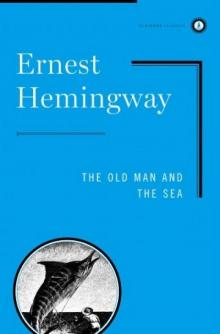 The Old Man and the Sea
The Old Man and the Sea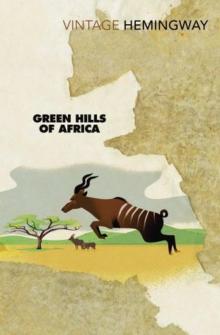 Green Hills of Africa
Green Hills of Africa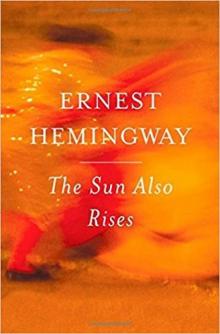 The Sun Also Rises
The Sun Also Rises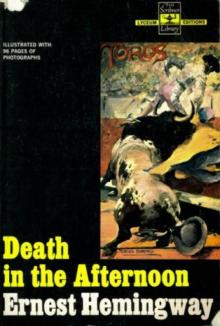 Death in the Afternoon
Death in the Afternoon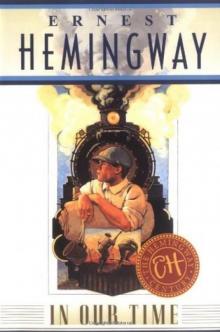 In Our Time
In Our Time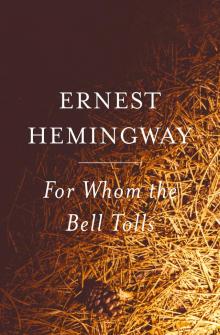 For Whom the Bell Tolls
For Whom the Bell Tolls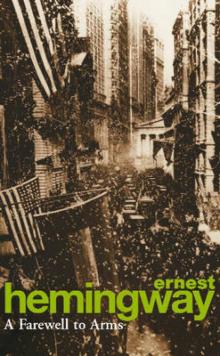 A Farewell to Arms
A Farewell to Arms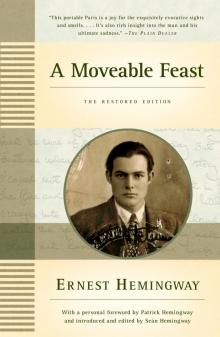 A Moveable Feast
A Moveable Feast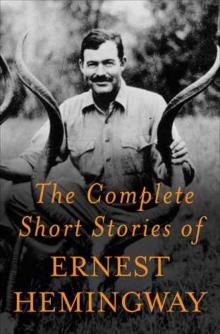 The Complete Short Stories of Ernest Hemingway
The Complete Short Stories of Ernest Hemingway Big Two-Hearted River
Big Two-Hearted River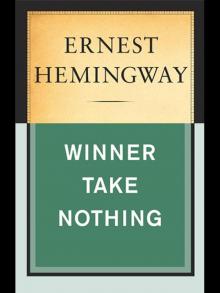 Winner Take Nothing
Winner Take Nothing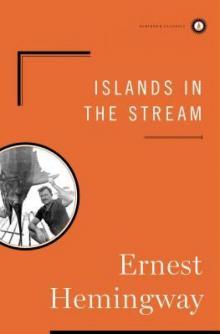 Islands in the Stream
Islands in the Stream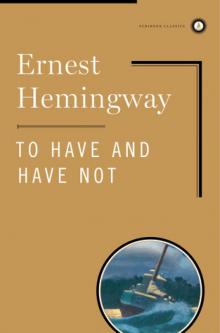 To Have and Have Not
To Have and Have Not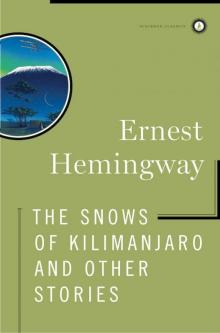 The Snows of Kilimanjaro and Other Stories
The Snows of Kilimanjaro and Other Stories Across the River and Into the Trees
Across the River and Into the Trees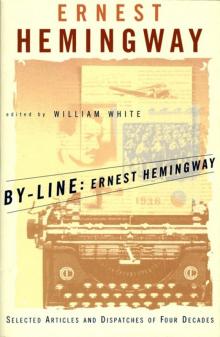 By-Line Ernest Hemingway
By-Line Ernest Hemingway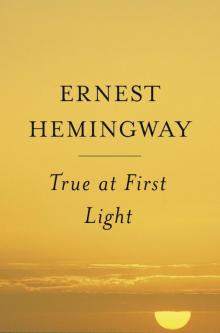 True at First Light
True at First Light Men Without Women
Men Without Women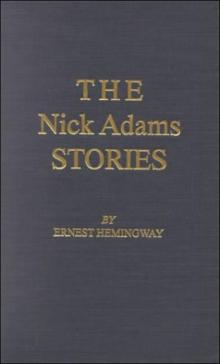 The Nick Adams Stories
The Nick Adams Stories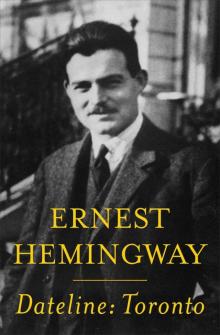 Dateline- Toronto
Dateline- Toronto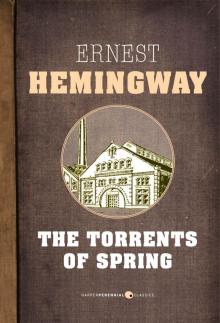 The Torrents of Spring
The Torrents of Spring Short Stories
Short Stories